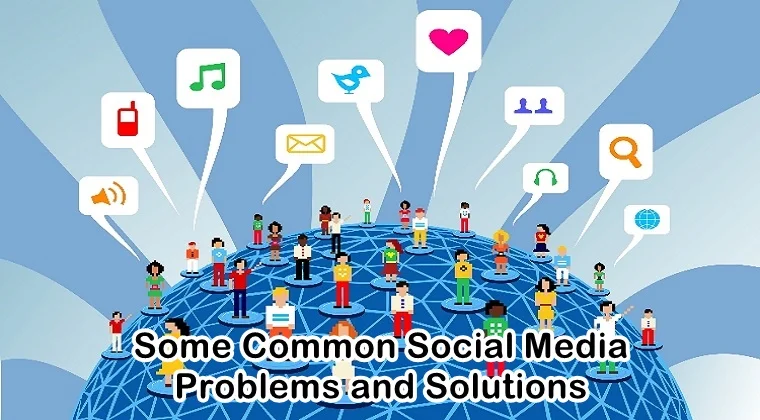Discussing Some Common Social Media Problems and their Solutions

Social media has brought a significant change in our lives, for better or worse. Though it has brought many advantages for us, there are plenty of social media problems that trouble us every day. So what exactly are these social media problems? And how do we deal with them? Let’s explore this topic in detail.
Social media offers us a great platform to meet new people, exchange our views with others, stay updated with the latest news and trends, find new job prospects, besides many other benefits and uses.
However, at times, it can also do more harm than good, especially to the younger generation. Perhaps the biggest social media problem is the amount of time people are spending on social media platforms. It has been reported on many occasions that children tend to use social media more than adults.
In an attempt to have a strong social media presence, many children and teens are spending lots of time on social media, especially if they are seeking blogging as their profession. While doing so, they often forget the impact of social media on their mental health and wellbeing.
By spending too much time on social media, they are not only exposing themselves to several risks but also leading towards many other problems in life. Lack of sleep, poor body posture, poor eyesight, depression, anxiety, and envy are some of the common problems with social media.
So what should be done to stop this?
Let us talk about what common problems social media has brought in our lives and what can we do to solve them. A combined effort to help those struggling with social media problems is much needed in this regard.
Common Social Media Problems and Solutions
There are plenty of social media problems that people face every other day. However, we are going to list some most common social media problems with their possible solutions. Let’s dive deeper into them in detail.
Spending Too Much Time on Social Media
A new report from the Pew Research Center came us a surprise for many as it states that 54% of teens are spending too much time on their cell phones as compared to parents whose percentage was only 36%. This report is a proof per se that teens think spending too much time on their cellphones and social media is a serious problem for them.
So what could be the possible solution? First of all, you do not need to get worried. You need to look for ways to overcome this problem. The only thing to stop yourself from spending too much time on social media is to limit your time spent on them and engage yourself in other activities.
Trust this. It’s a tried and tested technique and it always works. Social media can be highly addictive and overwhelming for most people at the same time. You need to learn how to filter out social media noise to focus on something else.
Getting Addicted to the World of Social Media
The second major social media problem would be getting addicted to it. Social media addiction is a real thing and cannot be ignored. If you ever find yourself getting lost in the world of social media and cannot function properly and feel agitated when you are away from it then you know you are already addicted to it.
You start feeling deprived, lost and become dependent on social media, which can be quite dangerous. So how would you deal with social media addiction? First of all, you do not need to become dependent on social media sites. Instead, you need to find some activities that can be enjoyed by not being online.
Find yourself some offline activities, hobbies, or meet up with your friends so you can go outside and have some distance from social media. As Dr. Barbara Greenberg, a clinical psychologist, explained in an article about the eight problems with teens and social media on HuffPost, our teens need to learn how to deal with free time without having to stare at the screens.
Impact on Health Issues Due to Social Media
Spending too much time on social media can pose you to several health issues. People use social media until the wee hours of the night and severely affect their sleep patterns. An article published on BBC about how social media can be bad for us reported that if we lie on the bed at night checking our Facebook and Twitter feeds, we are headed for restless slumber.
Besides sleep deprivation, we also face several other health issues such as depression, anxiety, feelings of insecurity and envy as well as poor eyesight and body posture.
To tackle health issues related to social media, you need to first improve your sleep. Make sure you sleep for about seven to eight hours a day. Do not use your phone when you’re in bed. Limit your online activities so you can pay more attention to offline activities.
Your kids will follow your routine so make sure you put limits to the amount of time you will allow them on social media. This way things will be under control.
Online Dangers on Social Media
Believe it or not but your children may be exposed to several online dangers on social media you have no idea about. Common online threats such as cyberbullying, stalking sexting, pedophilia, and pornography are ever-present on social media.
You may never know what your child is up to on social media and what sort of problems they are struggling with while being online. They may be targeted by a sexual predator or a cyberbully without you knowing. These dangers of social media can affect your child’s mental health negatively.
The best approach to ensure your child’s safety from these online threats is to monitor their online activity, especially what they are up to on social media. Cell phone monitoring apps like Mobistealth can be helpful in this regard. You need to keep a constant check on their social media activity so you can know who they are talking to, what they are posting or sharing on their profiles, etc.
It is better if you educate them to use social media the right way so they know what’s wrong and what’s right for them. Your constant guidance and support in this regard are going to help your children in keeping themselves secure online.
Also, make sure you do not allow your child to put up their personal information on social media profiles. Anything they post online is going to remain public forever, which means their data may be at the risk of getting into the wrong hands. Therefore, they need to be extremely careful about what information they share online.








